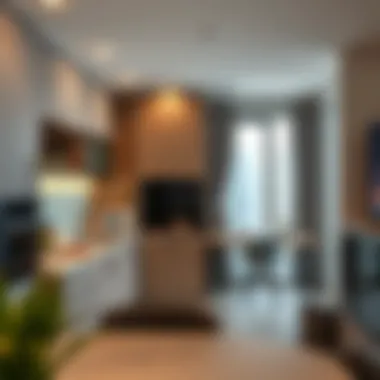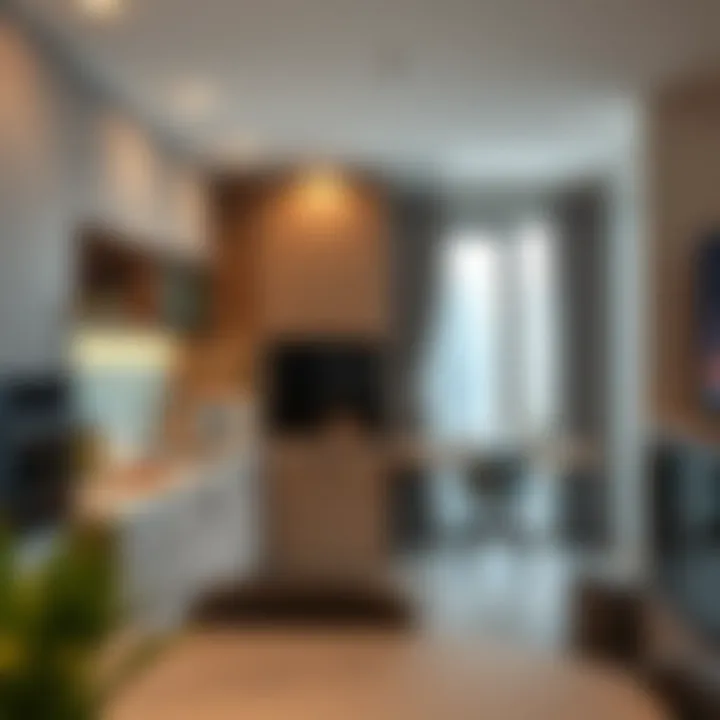Rental Apartments in Dubai: A Complete Overview


Intro
The allure of Dubai's skyline, with its dazzling architecture and luxurious lifestyle, makes it a magnet for people from all walks of life. Whether you're an expatriate seeking a new home, an investor looking to capitalize on a booming market, or simply someone intrigued by the vibrant culture of this city, understanding the intricacies of rental apartments in Dubai is essential. This guide digs deep into the current rental landscape, offering insights into neighborhoods, costs, and lease terms. By the end, you’ll be equipped to navigate Dubai's competitive real estate market with confidence and strategic know-how.
Market Insights
Current Trends
The rental market in Dubai has seen notable shifts in recent years, reflecting broader economic conditions and changes in residency patterns. After a period of rapid growth, rental costs have stabilized, making it an attractive time for individuals and families interested in finding housing. Popular neighborhoods like Downtown Dubai and Jumeirah Beach Residence continue to draw renters due to their prime locations and amenities, but emerging areas like Dubai Marina and Business Bay have started to gain traction as well.
Many landlords are adopting flexible leasing terms, with shorter lease durations becoming more common. This change allows tenants to move as their needs evolve, catering particularly to the expatriate community who often find themselves in transient positions.
Price Analysis
A detailed look at the pricing reveals a wide range influenced by factors like location, apartment size, and building amenities. For example, a one-bedroom apartment in the Dubai Marina may set you back around AED 90,000 to AED 130,000 annually, while similar accommodations in areas further from the city center can cost significantly less.
- Luxury high-rises often come with a premium, attracting wealthy renters seeking expansive views and upscale facilities like pools and gyms.
- Affordable options are available in places like Al Quoz and Deira, catering to those who prioritize budget over opulence.
An important consideration is the impact of market saturation. While renting might seem appealing, buyers in some districts can benefit from competitive pricing and favorable investment returns.
Investment Strategies
Buying vs. Renting
When weighing the decision to buy or rent, it’s pivotal to consider both personal circumstances and market signals. Buying property in Dubai can yield high returns, but it requires significant upfront investment, including down payments and closing costs. Conversely, renting offers flexibility but reduces long-term asset accumulation.
Many investors, particularly those with modest budgets, find that rent-to-own schemes present a balanced approach, allowing them to ease into ownership while still enjoying the benefits of rental living.
Financing Options
For those set on purchasing, understanding the financing landscape is key. Mortgages in Dubai often cater to both locals and expatriates, although terms can vary:
- Local banks may offer favorable rates to established residents, usually around 3-4% interest.
- International banks might also provide loans, but they often come with higher interest rates and additional requirements.
Potential buyers should consult with financial advisors to navigate the underwater currents of interest rates, loan terms, and government regulations affecting foreign investors in the real estate market.
"Investing in rental property in Dubai isn’t just about the property itself; it’s about understanding the lifestyle and needs of your target tenants."
By keeping a finger on the pulse of these factors, both renters and investors can position themselves advantageously in a rapidly changing market.
For more insights, check out reputable resources like Wikipedia and Britannica for broader economic trends or dive into specific forums like Reddit to gauge community sentiments and personal experiences.
Understanding the Dubai Rental Market
When considering the vibrant city of Dubai, the rental market stands out as a crucial aspect for anyone looking to live or invest there. Understanding this market is not merely about knowing the price of rent; it encompasses a diverse range of factors that can deeply influence your experience as a tenant or a landlord. This section provides insight into the dynamics of the Dubai rental landscape, highlighting essential elements that impact rental decisions.
Current Trends in Rental Pricing
Rental pricing in Dubai is a reflection of its economic health and demographic shifts. Recent trends indicate fluctuations largely influenced by factors such as supply and demand dynamics. For instance, certain areas like Dubai Marina see higher rental rates due to their popularity among expatriates and tourists, while neighborhoods like Deira may offer more competitive prices to attract long-term residents. On average, rental costs have experienced a slight uptick in prime locations, driven by increased demand as more businesses are setting up shop in the emirate, bolstering job opportunities.
Price fluctuations can also be attributed to seasonal trends, with rents often rising in the cooler months when many expatriates relocate. An understanding of these patterns is key. Tenants seeking budget-friendly options might consider timing their searches according to rental cycles, particularly during off-peak seasons when landlords might offer concessions or lower rates.
Influences on Rental Demand
Several elements influence the demand for rental apartments in Dubai, making it essential for prospective tenants and property investors to be attuned to these factors. Economic factors, such as job creation and population growth, play pivotal roles in driving available rental properties. Dubai's robust job market, especially in tourism and financial services, tends to attract a steady influx of expatriates seeking rental accommodations.
Another consideration is the government's policies and developments aiming to promote long-term residency. For example, initiatives such as the Golden Visa have made it easier for expatriates to live and work in Dubai, thus increasing demand for rental properties. Moreover, the upcoming Expo and continual investments in infrastructure can spur demand in particular areas, leading to quick changes in pricing and availability.
Projected Market Changes
Looking ahead, the projected changes in the Dubai rental market indicate a more stabilized environment compared to previous volatile years. Analysts suggest that, although some fluctuations are inevitable, a gradual increase in rental prices is expected as the economy rebounds and expatriate population grows. The introduction of new residential developments will likely provide more options for renters, from budget-friendly studios to luxury apartments, thus impacting rental pricing.
From a legal standpoint, upcoming regulations aimed at protecting tenant rights could also reshape the market. The focus on creating more transparent rental agreements will not only enhance security for tenants but also encourage foreign investment in the property sector. As investors and tenants alike navigate through these changes, staying informed about market trends and legislative developments can foster better decision-making in this competitive realm.
"Grasping the nuances of the rental market is key. It’s not just about knowing how much rent you’re paying—it's about understanding the ecosystem surrounding that price."
In summary, a thorough grasp of the Dubai rental market provides significant advantages for tenants and landlords alike. Keeping abreast of current trends, the influences driving demand, and potential market shifts can lead to informed decisions that optimize the rental experience. Understanding these elements can ultimately empower individuals to navigate the complexities of renting in this bustling city.
Types of Rental Apartments
When navigating the Dubai rental landscape, understanding the types of rental apartments available is crucial. Each category offers distinct features that cater to various needs, budgets, and lifestyles. From compact studios to expansive luxury apartments, the choices can be staggering. Identifying the right type helps prospective renters make informed decisions while optimizing their living experience in this dynamic city. Here’s a breakdown of the predominant types of rental apartments in Dubai that one might consider.
Studio Apartments
Typical Features
Studio apartments epitomize efficiency and simplicity. These small, self-contained units typically consist of a living area, bedroom space, and kitchen, all in an open layout. The key characteristic of a studio is its ability to maximize utility from a limited footprint, making them an ideal choice for lone dwellers or young couples. In addition, they often come furnished, which saves on initial setup costs.
One unique feature that stands out in many studio apartments is the clever integration of smart storage solutions. Built-in wardrobes and multifunctional furniture can turn what might feel like cramped quarters into a cozy home. However, one must consider that the lack of separate rooms may not suit everyone's preferences, especially those accustomed to larger living spaces.


Cost-Effectiveness
Cost-effectiveness is another significant aspect of studio apartments. Generally, they are more affordable than larger one-bedroom units or homes, making them appealing for budget-conscious renters. The affordability of studios means that individuals can live in prime areas that might otherwise be out of reach if considering larger apartments.
Also, the lower overhead costs – like utilities, maintenance, and furnishings – contribute to their appeal. However, it’s worth noting that depending on the location, the savings can vary, and some premium districts may inflate even studio costs to uncomfortable levels.
One-Bedroom Apartments
Suitability for Singles and Couples
One-bedroom apartments represent a comfortable middle ground for individuals and couples seeking more space than a studio offers. A living room, kitchen, and separate bedroom allow a little more breathing room, promoting a sense of privacy without sacrificing convenience. The key characteristic here is versatility; one-bedroom apartments cater well to a range of lifestyles, whether a single professional or a couple sharing the space.
Furthermore, a great unique feature of these apartments is the potential for better natural light since they often have larger windows or balconies. Amidst the skyscrapers, having a small private sanctuary can be refreshing. Yet the trade-off could be a slightly higher cost in rent, which potential tenants must weigh against their budget.
Market Availability
As a more common option, one-bedroom apartments generally enjoy higher availability across various neighborhoods. This prominence in the market makes it easier for renters to find options that suit specific requirements, from location to amenities. Given their popularity, it’s wise to act swiftly; the supply can dwindle quickly during peak rental seasons.
Moreover, the variety of choices can also present challenges. Renters may feel overwhelmed by the options, with variables such as layout, age of the building, and included amenities affecting their choices. Keeping a clear list of must-haves and deal-breakers can simplify the decision-making process in this saturated market.
Luxury Apartments
High-End Amenities
High-end amenities characterize luxury apartments, often providing indulgences like state-of-the-art gyms, swimming pools, and concierge services. The list of features is often extensive, layering the basic comforts of a home's luxury living with the bells and whistles that set these apartments apart. Well-designed outdoor spaces, luxurious finishes, and smart home technology further enhance the living experience.
One such unique feature is how many luxury apartments offer exclusive access to community facilities. From rooftop lounges to private cinemas, the lifestyle encapsulated in these properties appeals to those who seek both comfort and status. However, it’s vital to consider that these upgrades come with a price; the increased costs might not fit every budget, and tenants must assess if the benefits correspond to their lifestyle choices.
Target Demographics
Luxury apartments typically attract a demographic that values both high living standards and privacy. Business professionals, expatriates, and affluent individuals searching for an upscale lifestyle represent the primary clientele. The curated environment appeals to those who wish not only to reside in Dubai but to do so with prestige.
A lovely unique feature here is the community aspect; luxury living often brings similar-minded residents together, fostering networking opportunities and a sense of belonging among tenants. Still, one must also consider the potential for a mismatch in lifestyle; the exclusivity of luxury communities can bring about pressures, should expectations be misaligned.
Serviced Apartments
Advantages for Expats
Serviced apartments present a unique opportunity, especially for expatriates. These establishments often cater to international workers and tourists alike by bundling living space with essential services like cleaning, maintenance, and sometimes even meal options. The key characteristic of serviced apartments is the blend of both comfort of a home and convenience like a hotel.
A distinct unique feature is their flexibility. Many serviced apartments offer short-term leases, which allow expats to settle into Dubai without committing to long contracts right off the bat. It’s an excellent way for newcomers to get to know the city first, albeit sometimes at a higher rental cost compared to traditional apartments. On the flip side, the hustle and bustle of service-oriented living can be tiring for some who prefer more tranquility.
Hotel vs. Apartment Experience
When comparing serviced apartments to traditional hotel stays, the experience diverges significantly. In a serviced apartment, one gets the comforts of home—like cooking and doing laundry—while enjoying hotel-like perks, like room service or housekeeping. This distinct characteristic offers flexibility not found in a standard hotel room.
But renting a serviced apartment can sometimes come with higher costs compared to a standard rental, leading to potential sticker shock when everything is added up. Ultimately, it boils down to personal preferences about convenience, lifestyle, and budget.
Popular Neighborhoods for Rental Apartments
When diving into the world of rental apartments in Dubai, understanding the neighborhoods is like having a map in a maze. Each area has its nuances, offerings, and communities that cater to different lifestyles. The right neighborhood can make or break the living experience. In a city as dynamic as Dubai, from bustling centers to serene coastal areas, each location, with its unique flavor, presents possibilities for tenants. The choice of neighborhood affects your daily life, connections, and even your overall happiness.
Downtown Dubai
Standing at the heart of Dubai, Downtown is nothing short of spectacular. It’s home to the iconic Burj Khalifa and The Dubai Mall. Renting an apartment here means living amidst luxury and convenience. The vibrant atmosphere is palpable with buzzing restaurants, cafes, and culture.
Residents can enjoy scenic views and sidewalks lined with green spaces. The area is a hub for expats and families alike, valuing accessibility and modern amenities. However, potential renters should be ready for the premium price tags attached to this chic urban life. The average rental costs here can be quite high, so budgeting is crucial for anyone looking to make Downtown their home.
Dubai Marina
Dubai Marina can be described as a blend of extravagance and leisure. Stretching along a beautiful waterfront, the Marina offers a lifestyle defined by its vibrant social scene and spectacular skyscrapers. Many rental apartments provide panoramic views of the Arabian Gulf, a definite selling point for those aiming to enjoy mesmerizing sunsets.
The Marina Walk is popular among joggers and leisure seekers, creating an energetic community vibe. This area tends to attract young professionals and affluent individuals looking for a blend of work and play. Rentals are competitive; though they reflect the lifestyle offered, it’s essential to weigh the long-term implications of such an investment.
Jumeirah Beach Residence
If the sound of waves crashing against the shore intrigues you, then Jumeirah Beach Residence, or JBR, could be your ideal spot. Known for its beachfront apartments, JBR becomes a lively hub during weekends and holidays, with families indulging in beach activities and visitors exploring vibrant shops.
Living in JBR means having direct access to stunning beaches, leisure activities, and a plethora of dining options. The relaxed atmosphere is inviting but with the influx of tourists, it may not be for everyone. Monthly rents here can vary based on the apartment view and floor level. Still, for those seeking a beach lifestyle, it might be worth every penny.
Business Bay
Emerging as a modern business hub, Business Bay offers a unique proposition for both professionals and families. This area is characterized by its high-rise buildings and proximity to major business districts. What's appealing here is the eclectic mix of both residential and commercial spaces. Potential renters can enjoy a balanced life, with easy access to work and home.
Renting in Business Bay generally comes with more reasonable prices compared to neighboring Downtown Dubai, making it a strategic choice for professionals desiring to be close to work while enjoying decent living spaces. Proximity to transportation links is another plus that cannot be overlooked.
Deira
On the older and more traditional side of Dubai lies Deira, known for its bustling markets, local charm, and rich heritage. Those looking to experience a different cultural perspective might find Deira more suitable. Rental prices here are often more accessible, appealing to families and expatriates seeking affordability combined with a dynamic lifestyle.


Living in Deira means enjoying a cross of old and new — from spice souks to modern malls. There might be compromises on luxury, but the community vibe is strong, offering a unique living experience that feels authentic and alive.
Ultimately, choosing the right neighborhood comes down to knowing what you value most in your daily life. Each of these areas has its strengths and drawbacks, and understanding them is key to making a wise decision in Dubai's vibrant real estate landscape.
Legal Considerations for Renting in Dubai
Understanding the legal framework when renting in Dubai is crucial for both expatriates and locals. It ensures not only a smooth renting experience but also encompasses aspects such as tenant rights, rental agreements, and potential disputes. The vibrant rental market in Dubai attracts a mix of investors and expats, making it essential to navigate these legal waters effectively.
Understanding the Tenancy Agreement
A tenancy agreement is more than just a piece of paper; it's a binding contract that sets the rules for both landlord and tenant. This document typically includes:
- Duration of the Lease: Specifies how long you’ll be renting the property. Generally, a lease in Dubai is for at least one year.
- Rental Payments: Details the amount of rent, payment method, and due dates. Make sure to negotiate this clearly.
- Deposit: Usually, a security deposit equivalent to one month’s rent is required. Ensure it’s mentioned in the agreement along with terms for its return.
- Maintenance Obligations: Outlines who is responsible for repairs and upkeep. It’s critical to clarify this to avoid disputes later.
A well-drafted tenancy agreement protects both parties and reduces the chance of future conflicts.
It’s wise to read between the lines and clarify any ambiguous clauses with the landlord or agent.
Rent Increases and Regulations
In Dubai, rules regarding rent increases are regulated by the Real Estate Regulatory Agency (RERA). Understanding these regulations helps tenants avoid surprises. Key points to note include:
- Annual Rent Cap: The rental increase is capped based on the current rental price compared to similar properties in the neighborhood. RERA provides a rental index to aid in this.
- Notice Period: Landlords must give a 90-day notice before any rent increase, giving you time to assess your options.
These regulations help maintain fairness in the rental market, though it's advisable to keep your ears to the ground on current trends. Understanding how often or to what extent rents might increase in your area can help in budgeting.
Scams and How to Avoid Them
The allure of Dubai's real estate market can sometimes attract mischief-makers. Scams can range from fake listings to dishonest agents, leading to financial loss and considerable stress. To stay safe, consider these pointers:
- Verify Listings: Always check if the property actually exists and is listed by a legitimate agent or landlord. Websites like dubizzle.com and propertyfinder.ae can be textured checkers.
- Meet in Person: Whenever possible, arrange a visit to see the property firsthand. Pictures can be misleading, so nothing beats an actual walkthrough.
- Avoid Cash Transactions: Always insist on using cheques or bank transfers for payment. This creates a formal record that is vital in case disputes arise later.
Being wary and doing due diligence can save you a lot of time and trouble. Remember, if an offer seems too good to be true, it probably is.
Negotiating the Lease
Negotiating a lease is a pivotal milestone in securing an apartment in Dubai. It's much more than simply putting pen to paper; it’s about striking a balance between what the landlord is offering and what the tenant truly needs. In a market as dynamic as Dubai's, where prices fluctuate and demand is keen, finding common ground during negotiations can lead to favorable terms and even significant savings.
A well-negotiated lease can enhance your living experience in several ways. It gives tenants the chance to clarify responsibilities, ensure that expectations align, and address particular requirements such as maintenance responsibilities or lease extensions. Consider that most landlords are open to discussions. After all, they’re looking to fill their units, and a good tenant-landlord relationship can lead to more stable, long-term occupancy.
In addition, effective negotiation can alleviate potential surprises down the line. For instance, discussing utilities or maintenance responsibilities upfront helps avoid misunderstandings later. Consequently, being well-prepared and armed with knowledge becomes essential to navigating the negotiation landscape.
Tips for Effective Negotiation
When entering a negotiation, several strategies can lead to a successful outcome:
- Do Your Research: Before stepping into negotiations, know the average rental prices in the area you are considering. Websites like PropertyFinder and Dubizzle can provide critical insights into the market rates.
- Know Your Budget: Have a clear understanding of your financial limits. This will help you make realistic offers and avoid overcommitting.
- Be Professional and Courteous: Remember, maintaining professionalism establishes goodwill. Treating the landlord or agent with respect can make them more inclined to make concessions.
- Highlight Your Qualities as a Tenant: If you have a steady job or excellent rental history, use it to your advantage. Some landlords might be willing to lower rent for tenants who seem responsible and stable.
- Ask About Extras: Don't hesitate to negotiate for extras such as including furniture, maintenance services, or parking allowances. Sometimes landlords might be more flexible about these items rather than rental price.
- Be Prepared to Walk Away: If the terms don’t suit you, be willing to explore other options. There are plenty of rentals in Dubai; having alternatives may strengthen your negotiating position.
Common Rental Terms to Query
Understanding the lease terms is crucial. Here are some key terms that tenants often overlook but should always query:
- Start and End Dates of Lease: Confirm how long the lease lasts and when it begins to avoid unexpected overlaps or disruptions.
- Rent Amount and Payment Schedule: Clarify the total rent and when payments are due. Ask if there are any penalties for late payments.
- Deposit Requirements: Be clear on how much deposit is needed and under what conditions it’s refundable. Knowing these details can save headaches later.
- Maintenance Responsibilities: It's important to understand who handles repairs and maintenance. Is it the landlord's responsibility, or will you be expected to take care of certain things?
- Termination Clause: Every tenancy agreement should specify conditions under which either party can terminate the lease. This is a safeguard for tenants should circumstances change unexpectedly.
By having these discussions upfront, landlords and tenants can limit potential disputes in the long run. Negotiation is just as much about understanding your rights and interests as it is about reaching an agreement.
"A penny saved is a penny earned." Knowing how to negotiate effectively could save you more than just a few dirhams.
As you navigate the maze of rental agreements, remember to approach everything with clarity and confidence. The goal is not just to find a place to live, but to foster a harmonious relationship with your landlord from the get-go.
Costs Beyond the Rent
When delving into the rental market for apartments in Dubai, one cannot overlook the often overlooked but crucial factor of costs that extend beyond the basic monthly rent. While securing a good deal on rent is paramount, it is equally vital to consider these additional expenses that can significantly impact your overall budget. Understanding these costs can mean the difference between a cozy, financially sound living arrangement and an unexpected financial strain. Let's break down what to expect when it comes to these supplementary rental costs.
Utility Costs
Utility costs are usually one of the first additional expenses that come to mind. In Dubai, these include services like electricity, water, and internet. The amounts can vary considerably based on the size of the apartment and the consumption habits of the residents.
- Electricity and Water: These are metered and billed monthly. On average, tenants can expect to pay anywhere from AED 300 to AED 700 for these services, depending on factors such as efficiency of the apartment's appliances and the number of residents.
- Internet and Television: Packages can range from AED 300 to AED 1000 a month depending on speed and the providers. Reliable internet is essential, especially for expatriates working remotely or families needing connectivity.
Factoring in these utilities when setting your budget can prevent unexpected financial headaches later on.
Maintenance Fees
Maintenance fees are another critical element to be mindful of. Often tied to the building or community your apartment is situated in, these fees generally cover the upkeep of shared facilities such as swimming pools, gyms, and landscaping.
- Monthly Fees: These can range from AED 350 to several thousand dirhams based on opulence and location. Luxury towers frequently come with higher fees reflecting their amenities.
- Special Assessments: Be aware that from time to time, you might encounter special assessments for major repairs, especially in older buildings. This is something to clarify before signing any tenancy agreement.
Understanding how maintenance fees work and what they cover is crucial, especially if you're considering a high-end apartment.


Agency Fees
Engaging a real estate agent can greatly aid in navigating the rental process in Dubai. However, this service does come at a cost.
- Typical Fees: Generally, agents charge about 5% to 10% of the annual rent as their commission. This fee is paid at the start of the lease and is necessary for securing your desired apartment.
- Negotiate Wisely: Some agents may be open to negotiation, especially if they see you as a long-term client or if the rental market is less competitive.
Beyond just finding an apartment, agents can provide valuable insight into local neighborhoods, pricing trends, and legal considerations, making the fee worth it in many cases.
"Being aware of additional costs helps ensure that your budget remains intact and you can manage your finances effectively while enjoying your new home in the bustling city of Dubai."
For more information on utilities in Dubai, you can visit Dubai Electricity and Water Authority (DEWA) or check out insights on Dubai Apartment rental agreements.
Understanding these facets of apartment renting will empower you to take control of your expenses, providing peace of mind as you settle into your new surroundings.
Preparing for Your Move
Moving to a new apartment, especially in a bustling city like Dubai, is no small feat. It’s akin to jumping into the deep end of the pool without knowing how to swim. It's crucial to be prepared, not just in terms of logistics, but also mentally and emotionally. Packing your life up and relocating can be a whirlwind of emotions, excitement, and perhaps a sprinkle of anxiety. It’s more than just moving belongings; it’s about creating a new home in a vibrant city.
When it comes to preparing for your move in Dubai, it’s essential to consider several facets, such as planning your packing strategy, understanding local customs, and ensuring you have the right support systems in place.
Essential Packing Tips
Packing might seem straightforward, but there’s an art to it that, when done right, can turn a daunting task into a manageable one. Here are some practical pointers:
- Organize Early: Start decluttering well before your move date. Go through your belongings and decide what sparks joy and what can be sold or donated.
- Use Quality Packing Materials: Invest in sturdy boxes, bubble wrap, and tape. You don’t want your prized possessions ending up in a heap on the ground.
- Label Everything: This is vital. Clearly label boxes with their contents and the room they belong to. A little organization goes a long way in making unpacking smoother.
- Pack an Essentials Bag: For the first couple of days in your new apartment, pack a bag with necessities like clothes, hygiene products, and important documents.
"Preparation is the key to success. The more effort you put into planning your move, the smoother the transition will be."
Taking these steps not only helps you move your things but creates a sleeping bag of comfort amidst the chaos.
Setting Up Your Utilities
Once the moving boxes are stacked in their new spots, it’s time to tackle an often-overlooked aspect: setting up your utilities. In Dubai, utilities like water, electricity, and internet are not just luxuries; they form the backbone of comfortable living.
Here’s how you can ensure a seamless setup:
- Contact Service Providers: Research local utility providers. For water and electricity, DEWA (Dubai Electricity & Water Authority) should be on your radar. Internet services can vary, so consider options like du or Etisalat.
- Schedule Connections Early: It’s wise to schedule connections a few days, or even a week, ahead of your move-in date. This avoids living in a connected beige box with no running water.
- Gather Necessary Documents: Usually, you’ll need to provide a copy of your tenancy contract, identification, and sometimes a security deposit. Have these ready when you reach out to the providers.
- Check Connection Fees: Different service providers might have varying setup fees. It’s worth asking to clearly understand any initial costs you’ll incur.
Being proactive about utilities can make a world of difference, allowing you to settle in without the hassle of playing catch-up. Remember, once the essentials are set up, the path to transforming your new apartment into a home begins.
Cultural Considerations for Expatriates
Cultural considerations play a vital role in the experience of expatriates living in Dubai. When moving to a place that’s a melting pot of cultures, it becomes essential for newcomers to grasp the local customs and traditions that shape daily life. Understanding these intricacies not only makes settling in smoother but also fosters respect and appreciation for the diverse community around them. For expatriates, navigating the cultural landscape of Dubai can lead to an enriching and fulfilling experience.
Understanding Local Customs
Getting a grasp on local customs is the first step for expatriates in Dubai. The United Arab Emirates, including Dubai, has a rich cultural heritage heavily influenced by its Islamic roots. This means that certain social norms and behaviors that might be perfectly acceptable in one’s home country may be frowned upon in the UAE. For instance, public displays of affection are generally considered inappropriate. Also, during the month of Ramadan, non-Muslims are expected to refrain from eating or drinking in public during daylight hours. It’s not just about following rules; it’s about showing respect for the customs that locals hold dear.
Here are a few other important customs:
- Greeting Etiquette: A simple handshake is usually how people greet each other, but it’s important to remember that physical contact between men and women should be avoided unless initiated.
- Dress Code: While Dubai is relatively liberal compared to other regions, modest dress is encouraged, especially in public places. It’s good practice to cover shoulders and knees to adhere to local sensibilities.
- Social Gatherings: When invited to a local home, bring a gift—such as sweets or fruit—to show appreciation.
Missteps in understanding these customs can lead to awkwardness or, at worst, offending someone. Thus, investing some time to learn about these local quirks goes a long way in ensuring smoother interactions in one’s new environment.
Community Integration
Integrating into the community can greatly enhance an expatriate's life in Dubai. Establishing connections not only fosters a sense of belonging but also opens doors to understanding the local lifestyle better. In a city like Dubai, where the population is a mix of locals and expatriates from all walks of life, finding common ground is often quite easy.
Here are ways to integrate better into the community:
- Participate in Local Events: Engaging in community events, whether cultural festivals or local markets, can provide insights into the traditions and social fabric that make up Dubai.
- Join Expat Groups: There are numerous expatriate clubs and online forums, like those found on Reddit or Facebook, where you can connect with people who share similar backgrounds or interests. This can be a great source of support and networking.
- Volunteer: Offering time to local charitable organizations not only helps give back to the community but also allows newcomers to meet locals in a positive environment.
Embracing the local culture helps to foster friendships and a sense of community. It also creates opportunities for exchanging ideas and experiences, enriching both the expatriate's life and that of the residents in Dubai.
By being aware and respectful of the cultural norms in Dubai, expatriates can find their footing more easily and enjoy an immersive and rewarding experience in this vibrant city.
Concluding Thoughts
In wrapping up our exploration of rental apartments in Dubai, it's important to underscore the dynamic nature of this market. As expats and investors navigate through the complex landscape of rental agreements and property types, there are significant factors to consider that shape their decisions.
Future of Renting in Dubai
Looking ahead, the future of renting in Dubai seems promising but not without challenges. The ongoing construction of new apartments and amenities indicates that supply will continue to grow, which could stabilize rental prices over time. However, with the influx of professionals attracted by Dubai’s bustling economy, demand for rental properties remains high.
This phenomenon can lead to price fluctuations, especially in sought-after areas like Dubai Marina and Downtown Dubai. Investors must keep an eye on trends such as the increased interest in sustainable living spaces and tech-integrated homes, which may guide their investment choices.
Moreover, as the city aims to attract more tourists and business professionals, potential changes in visa regulations might also influence the rental market. Adapting to these trends will be crucial for both tenants and landlords as the landscape continues to evolve.
Recap of Essential Takeaways
To reiterate the core points discussed in this guide:
- Understanding the Market: Familiarity with ongoing trends in rents and the factors that affect them is essential.
- Types of Apartments: Having a clear picture of available apartment types—from studios to luxury rentals—can help tenants make informed choices based on their needs and budget.
- Legal Framework: Awareness of tenant agreements, rights, and responsibilities can save potential headaches down the line.
- Moving Preparations: Planning ahead, especially regarding utility setups and expat community engagement, lays a strong foundation for a smooth transition.
"Knowledge is power," and knowing these essential details about the rental process in Dubai not only enhances your experience but also empowers you to make decisions that best suit your lifestyle. As you embark on your journey to find the perfect rental apartment, remember that thorough research and understanding of local nuances can lead to positive outcomes in this vibrant city.







